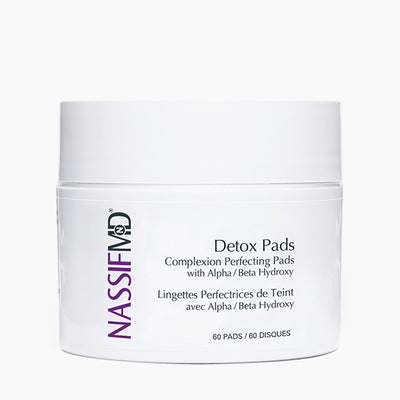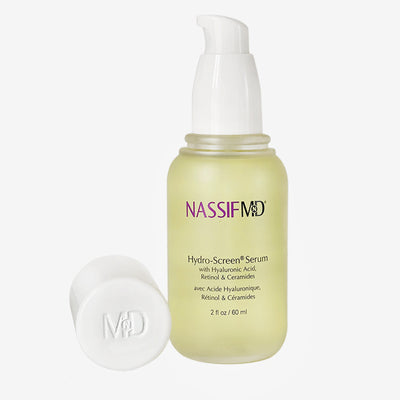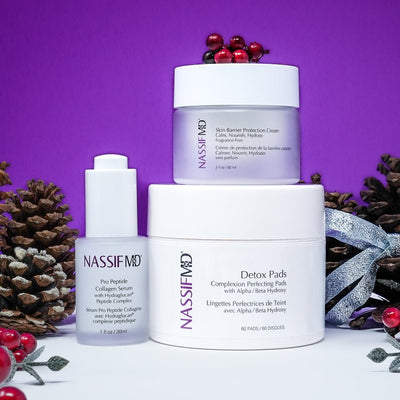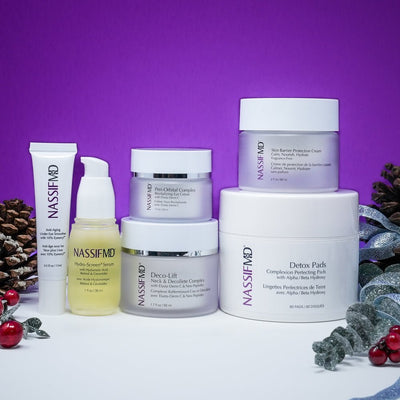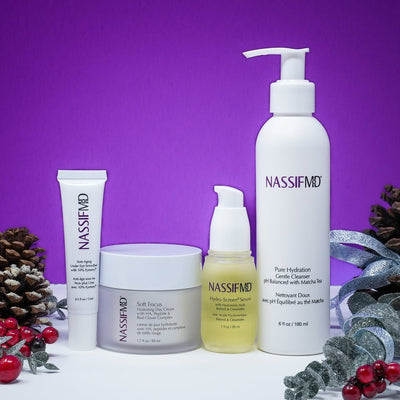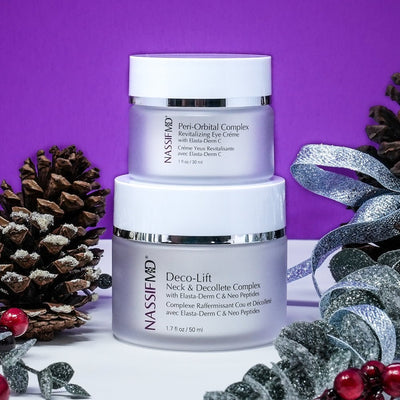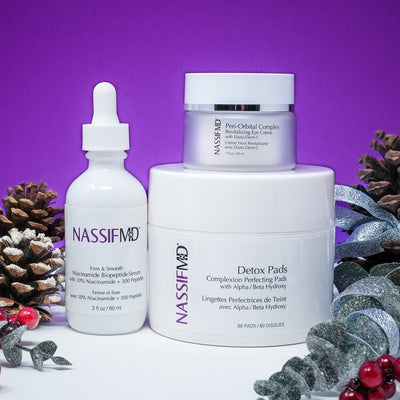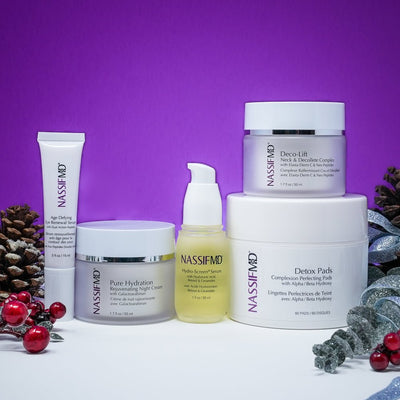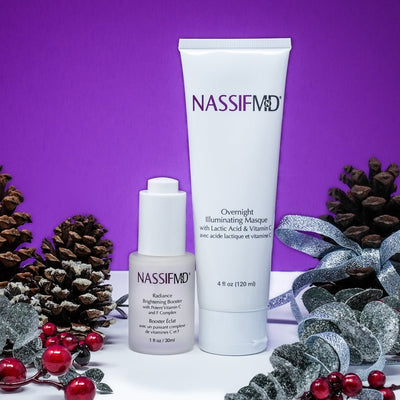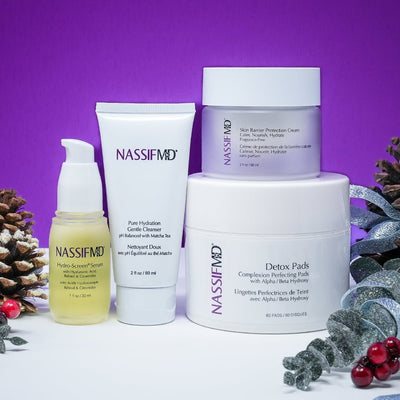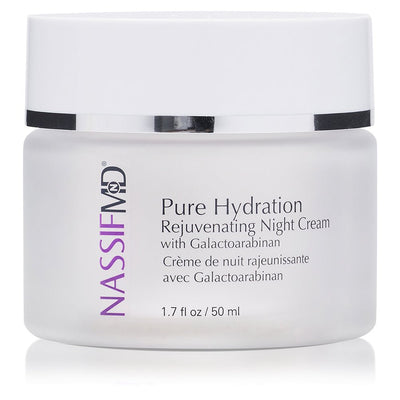What a Facial Reconstructive Surgeon Wants You to Know About Scalp Health
When we think about skin health, we give a lot of attention to the face and body but often neglect the scalp. Our hair hides the scalp, and we may not notice redness, dryness, inflammation, and other signs of poor skin health like we would on other areas of the body.
Yet, understanding the skin on the scalp and taking simple measures to exfoliate, nourish, hydrate, and protect produces a healthy scalp as well as healthy, shiny hair.
If you’ve been neglecting your scalp or have noticed buildup, dandruff, hair loss, dry or dull hair, this article is for you!
Keep reading to learn more about:
- Why is scalp health important?
- How to improve scalp health
- What is scalp exfoliation?
- The benefits of scalp exfoliation
- The best scalp detox scrub
Let’s jump right in!
Why is Scalp Health Important
The scalp is living, even though the hair is not, and your skin health includes scalp health. The scalp has its own microbiome, involved in the gut-skin axis.
Just like the skin on your face and body, dead skin cells of the epidermis slough off and regenerate new skin cells regularly (called cellular turnover). The second layer of skin, called the dermis, contains hair follicles.
When the scalp skin isn’t adequately nourished or exfoliated, dead skin cells, product residues, oils, and other impurities can build up, leaving you with a dry scalp, oily hair, poor hair growth, and other symptoms that affect how you look and feel.
The bottom line: healthy hair requires a healthy scalp.
How to Improve Scalp Health
Several easy ways to improve scalp health include massage, nutrition, and scalp exfoliation. Let’s look at each of these in more detail.
Massage
As we get older, the number of hair follicles and hair thickness decreases, which causes hair thinning. Scalp massage is one tool to foster hair growth and nourish the scalp. It’s great for people with sensitive scalps, which can be associated with hair loss.
Scalp massage increases blood flow to the area and stretches and softens the skin on the scalp. One small study trial demonstrated increased hair thickness following daily 4-minute scalp massages over 24 weeks.
In addition, scalp massage is relaxing and helps manage stress. Stress is another factor that plays a role in skin, scalp, and whole-body health.
You don’t need a trip to the salon or a massage therapist for a scalp massage; you can easily give yourself one right now. Use your finger pads to rub your head in a circular motion. Include all areas of the head and focus on areas of tension. Adjust the pressure to what feels good. Repeat daily for at least 4 minutes.
Hair-Healthy Diet
If you’ve read our article on an anti-inflammatory diet for skin health, it’s unsurprising that nutrition also plays a role in scalp health. Many anti-inflammatory principles apply, including choosing whole foods, a healthy Mediterranean-like eating pattern, and supporting the gut microbiome with plant foods and fermented foods.
For additional scalp support, consider adding in food sources of specific skin-healing nutrients, including:
- Zinc – oysters, bison, pumpkin seeds, turkey, lentils, yogurt
- Vitamin E – sunflower seeds, almonds, hazelnuts, peanut butter, spinach, broccoli
- Omega-3 fats – wild salmon, anchovies, sardines, mackerel
- Niacin (vitamin B3) – Liver, chicken, tomato sauce, turkey, salmon, sunflower seeds, pumpkin seeds, soybeans
Note that many of these foods are also rich in protein and minerals, the building blocks of hair.
Exfoliation
We typically think of exfoliation to create a beautiful complexion, but we should think of it for hair health too. Scalp buildup affects cellular turnover and leads to dull hair and flaky skin.
Exfoliation to remove product buildup, dead skin cells, and other impurities allow skin cell regeneration and repair of hair follicles, while natural oils protect and nourish the scalp. Let’s dive into scalp exfoliators and their benefits.
What is Scalp Exfoliation?
Just as you would exfoliate your face and body, you can exfoliate your scalp using physical and chemical exfoliation products, such as scalp scrubs.
Scalp exfoliators remove:
- Dead skin cells
- Toxins and impurities
- Buildup from hair care products
- Excess oils
- Dandruff
Exfoliation keeps your scalp and hair healthy. (Read more about skin exfoliation here.) (link to detox pads article)
Physical Vs. Chemical Exfoliation
Physical exfoliators remove buildup by rubbing and massaging the scalp. Examples include:
- Sea salt
- Sugar
- Ground oatmeal
- Charcoal
Chemical exfoliators are typically acidic solutions that help remove dead skin cells. Alpha hydroxy acids, such as salicylic acid and glycolic acid, are frequently seen in chemical peels and can be used on the scalp.
Regenine is a fruit acid complex derived from grape, apple, lemon, and wheat bran that acts as an alpha hydroxy acid-like exfoliant without drying or stripping the scalp.
Benefits of Scalp Exfoliation
Scalp exfoliation benefits everyone including those with dandruff, dry skin, oily hair, fine hair, and sensitive skin. The primary benefits include:
- Eliminating scalp buildup
- Preventing dry skin and dandruff
- Promoting hair growth and thickness
Eliminates Scalp Buildup
While it may not be obvious, the scalp is where a lot of buildup occurs. The buildup comes from dead skin, excess oil, and hair products, leading to clogged follicles, which impact hair growth. A weekly scalp scrub eliminates buildup and improves skin and hair health.
Prevents Dry Scalp and Dandruff
Dry skin on the scalp leads to dandruff, itchiness, redness, and irritation. Scalp scrubs help to prevent these issues while promoting nourished and hydrated skin.
Research suggests that essential oils, such as peppermint, tea tree, and rosemary oil, are a natural way to prevent and treat dandruff. Essential oils contain antimicrobial and antifungal compounds that target pathogens involved in dandruff.
Promotes Hair Growth
By encouraging cellular turnover, scalp scrubs promote healthy, shiny, thick, and nourished hair. As discussed, exfoliation removes dead skin cells and other buildups that clogs follicles and allows skin repair.
NassifMD® Purifying Scalp Detox Exfoliant Hair & Scalp Cleansing Scrub combines physical and chemical exfoliants for shiny, hydrated hair. It’s safe for sensitive scalps and won’t dry out or strip hair of natural oils.
NassifMD® Purifying Scalp Detox Exfoliant Hair & Scalp Cleansing Scrub contains:
- Sea salt – natural, physical exfoliant
- Regenine – fruit-based chemical exfoliant
- Niacinamide (vitamin B3), panthenol (vitamin B5), and biotin (vitamin B7) – to improve the shine and appearance of hair
- K-phyto – camellia extract to soothe and hydrate
- Aqaxyl – plant-derived humectants to improve the skin barrier and hydration
- Peppermint oil – a natural antimicrobial that cools and soothes the scalp
Besides the quality ingredients, this detox scalp scrub is unique because it is a cleanser plus exfoliant in one. Use it once per week in place of shampoo. Massage it into the scalp and work through the ends of your hair. As it rinses out, you’ll notice your hair feels silky, smooth, and soft.
Exfoliation isn’t just for your face. If you’ve noticed your hair is lackluster or your scalp is dry, you may not need to add more daily products to your hair. Instead, you might need a simple strategy for removing buildup and impurities. Exfoliate your scalp once weekly and notice how your skin and hair health shifts.
References:
- Burroni, A. G., Trave, I., Herzum, A., & Parodi, A. (2022). Sensitive scalp: An epidemiologic study in patients with hair loss.Dermatology reports, 14(3), 9408.
- Koyama, T., Kobayashi, K., Hama, T., Murakami, K., & Ogawa, R. (2016). Standardized Scalp Massage Results in Increased Hair Thickness by Inducing Stretching Forces to Dermal Papilla Cells in the Subcutaneous Tissue.Eplasty, 16, e8.
- Kim, I. H., Kim, T. Y., & Ko, Y. W. (2016). The effect of a scalp massage on stress hormone, blood pressure, and heart rate of healthy female.Journal of physical therapy science, 28(10), 2703–2707.
- National Institutes of Health Office of Dietary Supplements. Zinc Fact Sheet for Health Professionals. Accessed 2/23/23.
- National Institutes of Health Office of Dietary Supplements. Vitamin E Fact Sheet for Health Professionals. Accessed 2/23/23.
- National Institutes of Health Office of Dietary Supplements. Niacin Fact Sheet for Health Professionals. Accessed 2/23/23.
- Samargandy, S., & Raggio, B. S. (2022). Skin Resurfacing Chemical Peels. InStatPearls. StatPearls Publishing.
- Jain, S., Arora, P., & Nainwal, L. M. (2022). Essential Oils as Potential Source of Anti-dandruff Agents: A Review.Combinatorial chemistry & high throughput screening, 25(9), 1411–1426.


